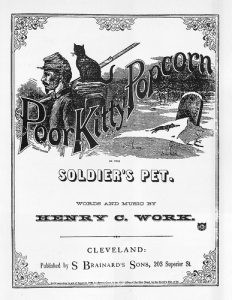Have you ever stumbled upon a piece of history that unexpectedly tugs at your heartstrings? As a content creator for payoffsong.com, I constantly explore fascinating musical narratives, and recently, a unique piece from the Smithsonian Libraries’ Special Collections captured my attention: the song “Poor Kitty Popcorn.” While the title might initially sound whimsical, evoking images of a lighthearted Popcorn Song, the story behind it is far more poignant and revealing about 19th-century American life and sentimentality. This isn’t just a popcorn song for kids; it’s a window into the emotional landscape of the Civil War era, viewed through the unlikely lens of a soldier’s devoted feline companion.
 Cover of Poor Kitty Popcorn
Cover of Poor Kitty Popcorn
The Story Behind “Poor Kitty Popcorn”: A Civil War Era Pet Song
“Poor Kitty Popcorn” is a song penned by the prolific American composer Henry Clay Work, a name you might recognize from other enduring tunes like “Grandfather’s Clock” and “Marching Through Georgia.” Published in 1866, in the immediate aftermath of the Civil War, this song tells a sentimental tale of a Union soldier and his loyal cat, Popcorn. The lyrics paint a vivid picture of their bond amidst the turmoil of war:
Oh she had a happy home beneath a southern sky,
But she pack’d her goods and left it when our troops came nigh,
And she fell into the column with a low glad cry, Meyow!
Round her neck she wore a ribbon—she was black as jet—Meyow!
And at once a gallant claim’d her for a soldier’s pet—Meyow!
All the perils of the battle and the march she bore,
Climbing on her master’s shoulder when her feet were sore,
Whisp’ring in his ear with wonder at the cannon’s roar, Meyow!
These verses illustrate the extraordinary loyalty of Kitty Popcorn, who seemingly abandons her Southern home to follow the Union troops and becomes a beloved mascot. The song emphasizes her resilience and devotion, picturing her bravely enduring the hardships of war alongside her soldier companion. This narrative reflects a common theme in 19th-century culture: the celebration of animal loyalty and the emotional support pets could offer, especially in times of stress and uncertainty.
Henry Clay Work: The Composer of Sentimental Ballads and Patriotic Anthems
Henry Clay Work was a master of crafting songs that resonated deeply with the American public. While “Poor Kitty Popcorn” might seem like a departure from his more famous patriotic pieces, it shares the same emotional depth and storytelling characteristic of his work. Work was known for his ability to capture the sentiments of the era, whether it was the nationalistic fervor of “Marching Through Georgia” or the tender nostalgia of “Grandfather’s Clock.” He also tackled social issues in his music, writing songs related to abolitionism and the temperance movement. “Poor Kitty Popcorn,” while seemingly a simple “popcorn song” about a cat, fits into his broader oeuvre by exploring themes of loyalty, loss, and the human condition in a relatable and affecting way.
Beyond the Novelty: The Deeper Meaning of Kitty Popcorn’s Tale
The song takes a tragic turn after the war. While the soldier returns home safely to the “Northern prairies,” Kitty Popcorn’s fate is heartbreaking:
Now the “cruel war is over” and the troops disband —Meyow!
Kitty follows as a pilgrim in the Northern land—Meyow!
Ah! But sorrow overtakes her, and her master dies,
While she sadly sits a gazing in his dim blue eyes,
Till by strangers driven rudely from the door, she cries, Meyow!
So she wanders on the prairie till she sees his form—Meyow!
Carried forth and buried roughly ‘mid the driving storm—Meyow!
Oh! Her slender frame, it shivers in the northern blast,
As she seeks the sand mound on which the snow falls fast,
And alone amid the darkness there she breathes her last Meyow!
This shift from wartime camaraderie to post-war sorrow highlights the precariousness of life and the depth of emotional bonds, even between humans and animals. Kitty Popcorn’s grief and ultimate demise underscore the theme of loss, a sentiment deeply resonant in a nation grappling with the aftermath of a devastating civil war. The image of a loyal pet suffering after the loss of its master would have evoked strong emotions in audiences of the time. It’s a reminder that even a seemingly lighthearted “popcorn song” can carry profound emotional weight.
“Poor Kitty Popcorn” in the Smithsonian Libraries: Preserving Musical History
The Smithsonian Libraries holds a copy of “Poor Kitty Popcorn” within its Dibner Library of the History of Science and Technology. This particular copy is a reprint from around 1920, part of a collection of Henry Clay Work’s songs. The original sheet music was published by S. Brainard’s Sons of Cleveland, with copyright dating back to 1866, registered to Root & Cady of Chicago. The Libraries’ copy was generously donated by Bertram Work, Jr., a descendant of the composer, connecting this historical artifact directly to the songwriter’s family.
Exploring “Poor Kitty Popcorn” reveals that it’s far more than just a quirky title or a simple popcorn song. It’s a piece of American history, reflecting 19th-century cultural values, wartime experiences, and the enduring bond between humans and their pets. Through the Smithsonian Libraries’ preservation efforts, we can continue to discover and appreciate these nuanced stories embedded within our musical heritage. Next time you think of a popcorn song, perhaps you’ll remember the poignant tale of Poor Kitty Popcorn and her unwavering loyalty.

